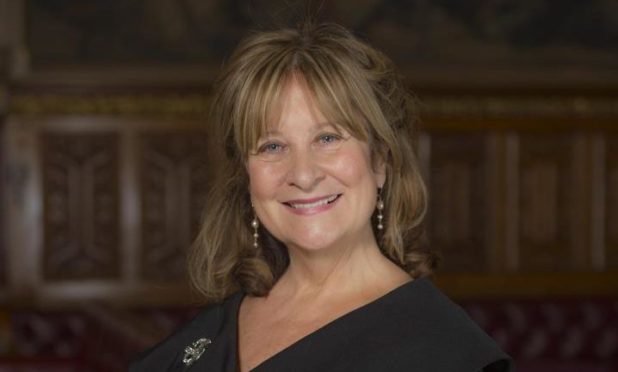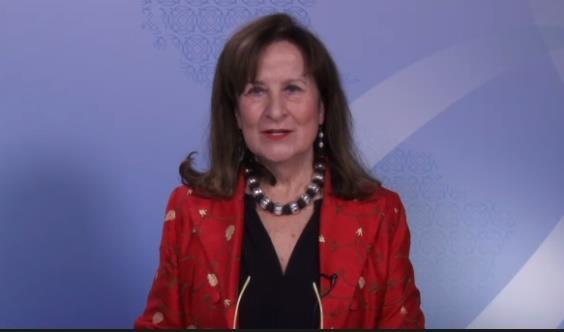Baroness Helena Kennedy would like social media bosses to appear before her inquiry into the misogyny faced by women in Scotland.
Tackling online abuse is just one strand she wants to consider as part of the new working group set up to independently consider how the Scottish criminal justice system deals with misogyny.
Kennedy remarks she has been given a “pretty free hand” from the Scottish Government over the group’s make-up but the majority are legal experts, given its remit is to look at “gaps” in the law for protecting women.
As well as looking at whether the law delivers for women, which she admits in “lots of areas it still doesn’t”, the distinguished lawyer would also like her working group to assess cultural attitudes around the way laws have been constructed.
Contacting social media companies will form part of her investigations but she says it is imperative that attention turns “much more on to what it means to be a man” and the importance of educating young boys.
The debate around trans rights is a fierce one but Kennedy is clear that misogynistic abuse is also directed at trans women and she does not want to “cheesepare on who gets protected and who doesn’t”.
‘It starts from when you are about 11’
The Scottish barrister, who has acted in many of the country’s most high-profile cases, including the Brighton bombing and the Guildford Four appeal, says there is now a “conversation taking place about the daily abuse women experience”.
“You have to find some way to deal with the fact women’s lives are being degraded by the constancy of this,” she adds.
“It means women are having to construct their lives in particular ways that are limiting in order to deal with it.
“You don’t stay late at work, you don’t want to be travelling at the end of the night in dark streets.
“It starts from when you’re about 11, you’re assessing risk.”
On whether the national outpouring of “anger and fear” among women and girls, sparked from the murder of Sarah Everard in London, will lead to a “watershed moment”, the 70-year-old says: “I’m now a woman of a certain age and over my lifetime in the law, over four decades, I now know these moments come and we think we will create great change and great change doesn’t quite come.
“You think you’re making a lot of headway, there’s a big debate and then a few things are done and they’ll put up more street lights, so you have to seize it.
I thought the world would have changed by now; I really did.”
“I think the ‘Me Too’ movement did move things along because suddenly women were saying ‘it wasn’t we didn’t complain, it was we weren’t listened to or we weren’t believed’.
“All the time, you’re making movements and you’re improving things.
“This is cultural and therefore the shift is a much harder one. We have to keep working at it.
“I’m realistic now, whereas at 28 I thought we would have sorted it out by the time I was 68.
“I thought the world would have changed by now; I really did.”
Kennedy says while women have made “many advances” over the last few decades this has created a “sort of backlash” from men “in reminding women who they are”.
She adds: “Misogyny in the modern world isn’t simply woman hating. It is about the business of keeping women in positions of subordination and feeling a sense of being entitled to abuse women without consequence.”
The respected human rights lawyer would like social media executives to appear before her working group to find out to “what extent the tech companies take down abuse of women because I think there’s very little of that goes on”.
She says: “I would very much like some of those tech people to come before our inquiry but, wait and see; they don’t turn up at the House of Commons so why would they for us?
“But we’ll try because I want to have that conversation about online harms, which is a big thing.”
Trans women
The QC takes on the role heading up the working group, following a fierce debate around trans rights in Scotland.
Kennedy, who acted in the first international trans case in respect of a trans woman who had been sacked and had faced discrimination, says that a “lot of misogynistic abuse is directed at trans women too”.
“We want to take the ugliness and cruelty out of daily existence and to create much greater levels of respect for each other,” she adds.
“I don’t want us to get into a thing of starting to cheesepare on who gets protected and who doesn’t.”
Some women’s rights campaigners have expressed concern that the newly-passed Hate Crime Bill did not include a specific protection on the basis of sex.
The Scottish Government has instead asked Kennedy’s working group to report back in a year on the possibility of creating a standalone offence of misogynistic harassment.
Kennedy says women should be comforted by the fact a “serious group of people is looking at how we can deal with the abuse that women experience daily, in the street, online, in their lives”.
She adds: “How can we create more effective law for women? This is what we’re doing and I would like women to take some comfort from that.
“This is going to be a serious piece of work to try and get better outcomes for women.”
‘System was different for women’
Kennedy, who was born in Glasgow in 1950 and brought up in a “working class family” with three other sisters, was inspired to fight for women by the experiences she witnessed around her.
“I was brought up by lovely parents in a very nice, supportive community and had very nice sisters,” she says.
“But you did know that all was not perfect in that world because my mother was someone that women used to come to when things weren’t good.
“My mother was one of those rather mother earth women that people went to for advice and counsel.
“I was that bookish child in the corner that sat reading books but all ears.
“I was aware of people whose husbands had drink problems and would drink a week’s wages and were left with nothing and my mum would go in the cupboard and give them tins of food to get them through the week.
“I remember my mother once giving money to give to somebody who was being beaten by her husband and my mother giving her the ability to go back to her family.
It was the 1970s and I was a young feminist and I started seeing the law in a much more analytical way with regards to the experience of women.”
“I was aware of those things happening to women and the double standards and the fact that women had to put up with those things.
“So when I started practicing as a young lawyer, and you’ve got to remember I was practicing for the Bar when only 6% of practitioners were women, and I started doing cases and from time to time I’d be acting for women.
“I started seeing how the system was different for women and that if you could tell the court your client was a great mother, and a fantastic wife and that she washed the carpets daily… if you could portray her in a certain way it would be fine.
“But if she was anybody who had ever prostituted herself, and if she drank, or if she went out in clothes considered seductive, all kinds of nonsense, and I started thinking: there is a different system here when it comes to women.
“It was the 1970s and I was a young feminist and I started seeing the law in a much more analytical way with regards to the experience of women.”
She adds: “Very often the law has been made from a perspective that hasn’t included the experience of women so it’s not going to surprise anybody with any imagination that law might not always work for women.”

